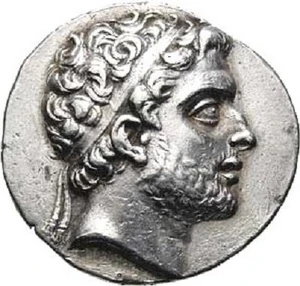Αλέξανδρος ο Φιλόδοξος

Ηγεμόνες Ελληνιστικής Εποχής
3ος Αιώνας π.Χ.
Όνομα: Αλέξανδρος
Ηγεμονικά Ονόματα
Ελληνιστική Μακεδονία
Ηγεμόνες Ελληνιστικής Μακεδονίας
Ηγεμονίδες Ελληνιστικής Μακεδονίας
Ιολαΐδες
Αντιγονίδες
Μακεδονική Αυτοκρατορία
Ηγεμόνες Μακεδονικής Αυτοκρατορίας
Στρατιωτικοί Μακεδονικής Αυτοκρατορίας
Έπαρχοι Μακεδονικής Αυτοκρατορίας
Αργεάδες
Ελληνιστική Ήπειρος
Ηγεμόνες Ελληνιστικής Ηπείρου
Ηγεμονίδες Ελληνιστικής Ηπείρου
Αιακίδες
Ιλλυρία
Ηγεμόνες Ιλλυρίας
Ελληνιστική Θράκη
Ηγεμόνες Ελληνιστικής Θράκης
Ηγεμονίδες Ελληνιστικής Θράκης
Αγαθοκλείδες
Ελληνιστική Αιτωλία
Στρατιωτικοί Ελληνιστικής Αιτωλίας
Ελληνιστική Αχαΐα
Στρατιωτικοί Ελληνιστικής Αχαΐας
Αθήνα
Ηγεμόνες Αθήνας
Στρατιωτικοί Αθήνας
Πολιτικοί Αθήνας
Αττική
Ηγεμόνες Αττικής
Σπάρτη
Ηγεμόνες Σπάρτης
Στρατιωτικοί Σπάρτης
Πολιτικοί Σπάρτης
Λακωνία
Ηγεμόνες Λακωνίας
Ελληνιστική Μυσία (Πέργαμος)
Ηγεμόνες Ελληνιστικής Μυσίας
Ηγεμονίδες Ελληνιστικής Μυσίας
Ατταλίδες
Ελληνιστική Βιθυνία
Ηγεμόνες Ελληνιστικής Βιθυνίας
Δοιδαλσίδες
Ελληνιστική Παφλαγονία
Ηγεμόνες Ελληνιστικής Παφλαγονίας
Πυλαμαινίδες
Ελληνιστικός Πόντος
Ηγεμόνες Ελληνιστικού Πόντου
Μιθριδατίδες
Ελληνιστική Καππαδοκία
Ηγεμόνες Ελληνιστικής Καππαδοκίας
Αριαραθίδες
Ελληνιστική Αρμενία
Ηγεμόνες Ελληνιστικής Αρμενίας
Αρταξιάδες
Ελληνιστική Αίγυπτος
Ηγεμόνες Ελληνιστικής Αιγύπτου
Ηγεμονίδες Ελληνιστικής Αιγύπτου
Λαγίδες
Ελληνιστική Κυρηναϊκή
Ηγεμόνες Ελληνιστικής Κυρηναϊκής
Ελληνιστική Κύπρος
Ηγεμόνες Ελληνιστικής Κύπρου
Ελληνιστική Συρία
Ηγεμόνες Ελληνιστικής Συρίας
Ηγεμονίδες Ελληνιστικής Συρίας
Σελευκίδες
Ελληνιστική Κομμαγηνή
Ηγεμόνες Ελληνιστικής Κομμαγηνής
Οροντίδες
Ελληνιστική Ιουδαία
Ηγεμόνες Ελληνιστικής Ιουδαίας
Ασμοναίοι
Πετραία Αραβία
Ηγεμόνες Πετραίας Αραβίας
Αρετάδες
Ελληνιστική Βακτρία
Ηγεμόνες Ελληνιστικής Βακτρίας
Ελληνιστική Ινδία
Ηγεμόνες Ελληνιστικής Ινδίας
Ινδοσκυθία
Ηγεμόνες Ινδοσκυθίας
Ινδοπαρθία
Ηγεμόνες Ινδοπαρθίας
Μαγαδία
Ηγεμόνες Μαγαδίας
Παρθική Αυτοκρατορία
Ηγεμόνες Παρθικής Αυτοκρατορίας
Ρωμαϊκή Αυτοκρατορία
Ηγεμόνες Ρωμαϊκής Αυτοκρατορίας
Στρατιωτικοί Ρωμαϊκής Αυτοκρατορίας
- Ένας στρατηγός της Μακεδονικής Αυτοκρατορίας
- Χρονική Περίοδος Ακμής: Ελληνιστική Εποχή, 4ος Αιώνας π.Χ.
- Γέννηση:
- Θάνατος:
Ετυμολογία[]
Ετυμολογικά, το όνομα "Αλέξανδρος" συνδέεται με την λέξη "άνδρας".
Γενεαλογία[]
| της Μακεδονίας
|
|---|
| Αργεάδες |
|
- Οίκος: Τυμφαίοι
- Μητέρα:
- Σύζυγος: Κρατησίπολις
- Τέκνα:
Βιογραφία[]
Τα σπουδαιότερα γεγονότα του βίου του είναι:
Alexander (in Greek Αλέξανδρος; killed 314 BC) was son of Polyperchon, the regent of Macedonia, and an important general in the Wars of the Diadochi.
Alexander obtains and loses Athens[]
Antipater, on his death (319 BC), had left the regency to Polyperchon, to the exclusion and consequent discontent of his own son, Cassander. The chief men, who had been placed in authority by Antipater in the garrisoned towns of Greece, were favourable to Cassander, as their patron's son, and Polyperchon's policy, therefore, was to reverse the measures of Antipater, and restore democracy where it had been abolished by the latter. It was then, in the prosecution of this design, that his son Alexander was sent to Athens, 318 BC, with the alleged object of delivering the city from Nicanor, who by Cassander's appointment commanded the garrison placed by Antipater in Munychia.
Before his arrival, Nicanor, besides strengthening himself with fresh troops in Munychia, had also treacherously seized the Piraeus. To occupy these two ports himself soon appeared to be no less the intention of Alexander, an intention which he had probably formed before any communication with Phocion, though Diodorus seems to imply the contrary. The Athenians, however, looked on Phocion as the author of the design, and their suspicions and anger being excited by the private conferences of Alexander with Nicanor, Phocion was accused of treason, and, fleeing with several of his friends to Alexander, was by him despatched to Polyperchon.
Cassander, arriving at Athens soon after and occupying the Piraeus, was there besieged by Polyperchon with a large force; but the supplies of the latter being inadequate, he was obliged to withdraw a portion of his army, with which he went to attempt the reduction of Megalopolis, while Alexander was left in command of the remainder at Athens. Here he appears to have continued without effecting anything, till the treaty and capitulation of Athens with Cassander gave the city to the power of the latter.
He attests himself in the Peloponnese[]
When Polyperchon, baffled at Megalopolis, withdrew into Macedonia, his son seems to have been left with an army in Peloponnese, where, as we read in Diodorus, the field was left open to him, and the friends of oligarchy were greatly alarmed by the departure of Cassander into Macedonia on the intelligence of the murder of Philip Arrhidaeus and Eurydice by Olympias, 317 BC.
During his absence, Alexander succeeded in bringing over to himself several cities and important places in the Peloponnese; but, on Cassander's return to the south, after crushing Olympias in Macedonia, he in vain attempted to check him by his fortification of the Isthmus of Corinth, for Cassander, passing to Epidaurus by sea, regained Argos and Hermione, and afterwards also the Messenian towns, with the exception of Ithome.
He passes to Cassander[]
In the next year, 315 BC, Antigonus (whose ambition and successes in the east had united against him Cassander, Lysimachus, Asander, and Ptolemy), among other measures, sent Aristodemus into the Peloponnese to form a league of amity with Polyperchon and Alexander; and the latter was persuaded by Aristodemus to pass over to Asia for a personal conference with Antigonus.
Finding him at Tyre, a treaty was made between them, and Alexander returned to Greece with a present of 500 talents from Antigonus, and a multitude of magnificent promises.
Yet, in the very same year, we find him renouncing his alliance with Antigonus, and bribed by the title of governor of the Peloponnese to reconcile himself to Cassander.
His death[]
In the ensuing year, 314 BC, we read of him as engaged for Cassander in the siege of Cyllene, which however was raised by Aristodemus and his Aetolian auxiliaries. After the return of Aristodemus to Aetolia, the citizens of Dyme, in Achaia, having besieged the citadel, which was occupied by one of Cassander's garrisons, Alexander forced his way into the city, and made himself master of it, punishing the adverse party with death, imprisonment, or exile.
Very soon after this he was murdered at Sicyon by Alexion, a Sicyonian, leaving the command of his forces to one who proved herself fully adequate to the task, his wife Cratesipolis (314 BC).
Υποσημειώσεις[]
Εσωτερική Αρθρογραφία[]
- Στάσανδρος
- Δόκιμος
- Αρριδαίος
- Φιλόξενος
- Νικάνωρ
- Πευκέστας
- Αμφίμαχος
- Σιβύρτιος
- Αλεξάνδρειοι Διάδοχοι
- Αργεάδες
- Αντιγονίδες
- Ηγεμόνες Μακεδονίας
Βιβλιογραφία[]
- Smith, William (editor); Dictionary of Greek and Roman Biography and Mythology, "Alexander", Boston, (1867)
Ιστογραφία[]
|
Αν και θα βρείτε εξακριβωμένες πληροφορίες "Οι πληροφορίες αυτές μπορεί πρόσφατα Πρέπει να λάβετε υπ' όψη ότι Επίσης, |
- Μην κάνετε χρήση του περιεχομένου της παρούσας εγκυκλοπαίδειας
αν διαφωνείτε με όσα αναγράφονται σε αυτήν
- Όχι, στις διαφημίσεις που περιέχουν απαράδεκτο περιεχόμενο (άσεμνες εικόνες, ροζ αγγελίες κλπ.)
